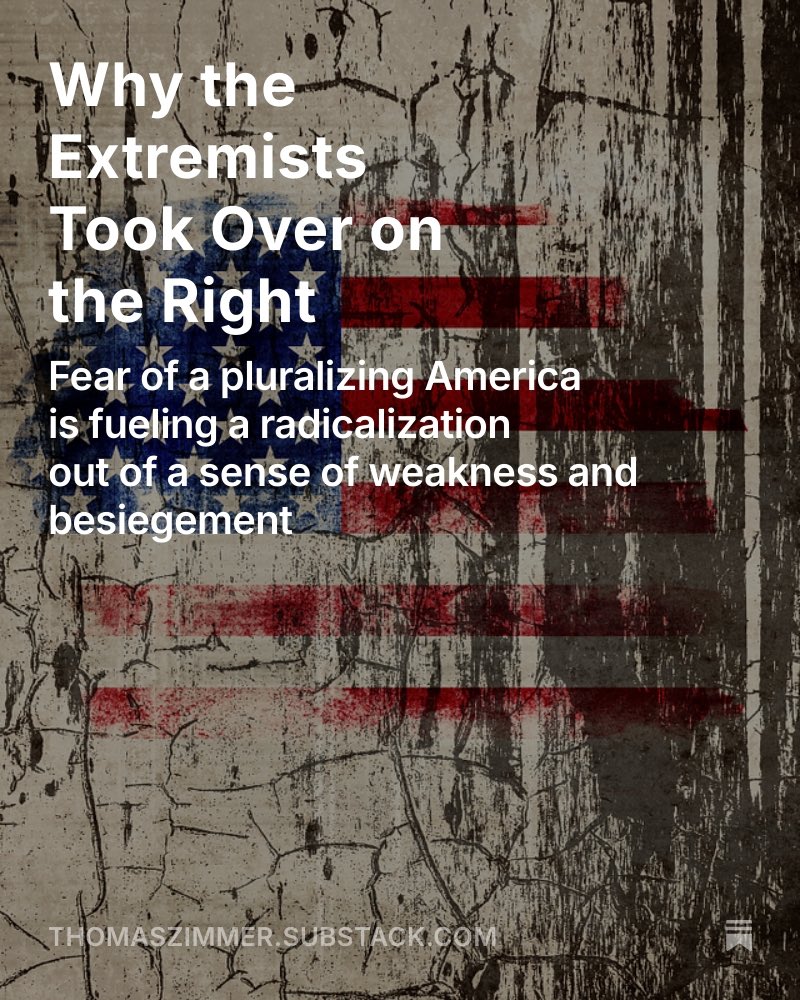I wrote about the aggrieved extremist who is firing federal workers and ravaging state capacity based on conspiratorial nonsense - and about mainstream media’s infuriating tendency to sanitize Russell Vought and the regime he serves.
This week’s piece:
steady.page/en/democracyam…
This week’s piece:
steady.page/en/democracyam…
About a week ago, the New York Times’ “The Daily” podcast portrayed Russell Vought as a devout Christian, a true “small government” conservative who loves the free market, and a man with a great work ethic. A remarkable combination of credulousness and deliberate whitewashing.
Vought is a key figure in the world of Trumpism, with a rare – and dangerous – combination of ideological zeal and operative competence, a fully committed extremist causing massive harm to millions of people.
But if you only listened to The Daily, you wouldn’t get any of that.
But if you only listened to The Daily, you wouldn’t get any of that.
Vought, we’re told, is a pious man who never curses. Ok! Not a word about his Christian nationalism; instead, one of the world’s most influential political platforms chooses to perpetuate the number one fallacy about the modern Right: That this is all about “small government.”
The Daily is committed to sanitizing Vought and ignoring what they regard as unsavory ideology. Because engaging with what is actually animating Vought would make it very hard to uphold the “normal politics” framework that defines much of mainstream political journalism.
The goal of too many journalists is to provide “balanced” coverage from a “neutral” position in equidistance to both sides. That framework is much easier to justify if you pretend to be dealing with “normal” politicians – as opposed to ideologues pursuing an extremist project.
It is October 2025, the assault on what is left of American democracy is escalating, and one of the New York Times’ most influential formats insists on presenting one of the Trumpist regime’s leaders as a devout “small government” conservative with a great work ethic.
But there is nothing noble or respectable about what Vought is doing, about his vision for the country. He is a fully competent, utterly committed radical ideologue. He lusts for counter-revolution and radical measures. There is no line he doesn’t feel justified to cross.
Vought embodies the radicalization of the conservative movement; his example captures how far removed from democratic politics the Trumpist Right is. Vought is convinced to be fighting a noble war against a vast leftist conspiracy that has supposedly taken over the country.
Vought is singularly focused on bending the entire government machine to Trump’s will. He believes that any check on the power of Donald Trump, who Vought literally describes as a “gift of God,” is illegitimate. There is no line he doesn’t feel justified to cross.
Key to understanding Vought’s worldview is the idea that the constitutional order - and with it the “natural” order itself - has been destroyed: The revolution has already happened, “the Left” won. Therefore, conservatives err when they try to preserve what is no more.
Power, Vought claims, now lies with a “permanent ruling class” of leftist elites who control all major institutions of American life and especially the “woke and weaponized” agencies of the state. In order to defeat them, conservatives must become “radical constitutionalists.”
While Vought traces the “leftwing revolution” back a hundred years, to the progressive era, there is no question that the election of Barack Obama was a radicalizing moment for him and many key thinkers on the radical Right - as were the multiracial protests in the summer of 2020
What he is railing against is a profound shift in culture, status… He is obsessed with the idea that America is controlled by a leftist “ruling elite” - but “elite” isn’t defined socio-economically or by political power, it means something like: Getting to define “real America.”
Vought is not interested in democratic politics: He seeks to “traumatize” civil servants, use the military to suppress protests, and sees Trump as an agent of God’s will. He is convinced to be fighting a noble war to defend his “real America” of white Christian patriarchal rule.
Vought’s ideology of “radical constitutionalism” captures the defining sensibility on the Trumpist Right: “The Left,” he believes, has command of America, there is nothing left to conserve, nothing short of a radical “counter-revolution” can now save the nation.
Vought is at war with large swaths of the population, with the very idea of a democratic pluralism. If you have correctly identified that this guy is now in a really powerful position, that people like him are in control of the government, how is that not the main story?
The Daily’s credulous/deliberately misleading portrait of Vought matters because it is indicative of a much broader tendency to normalize the assault on the constitutional order - to sanitize those who are responsible for it and the extremist ideas that are animating them.
Democracy Americana is a publication solely funded by readers. If you find pieces like this one helpful, you can subscribe for free. Or consider becoming a paid member: As an independent writer, I fully rely on your help to make this work possible.
steady.page/en/democracyam…
steady.page/en/democracyam…
• • •
Missing some Tweet in this thread? You can try to
force a refresh







